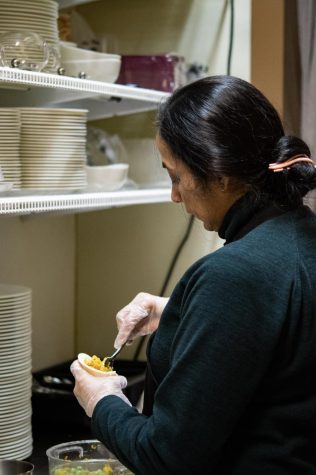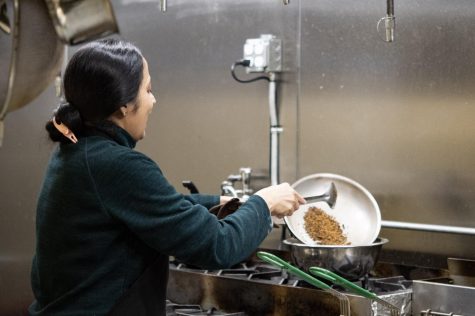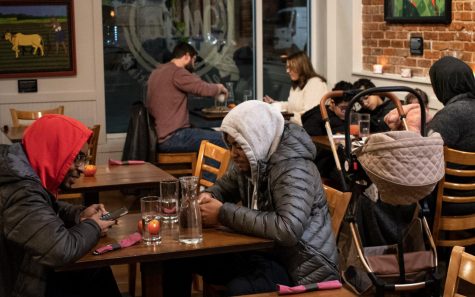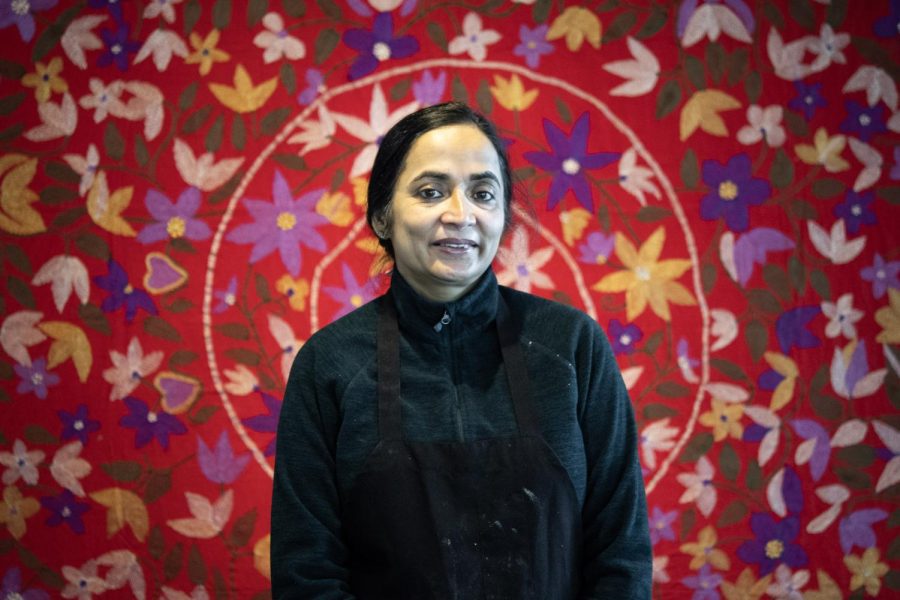‘Food can heal everything’
Abtesam Khan, owner and head chef of Mela Bangladeshi Cuisine, serves authentic, health-conscious meals.
Abtesam Khan in Mela Bangladeshi Cuisine.
March 9, 2023
Abtesam Khan, Mela Bangladeshi Cuisine owner and head chef, said her journey with cooking began with her children: twin sons who were born prematurely.
Their doctor said that good nutrition would be imperative for their growth, Khan said. Ever since, she said she has focused on making healthy, home-cooked meals.
Khan said that making food at home was better than going out.
“I found making food is way cheaper, and way tastier and more fun than buying anything,” Khan said.
Khan, commonly known as Shaheen, said she closed Mela’s first location in Moscow in 2018 due to the pandemic. In 2022, Khan re-opened Mela in Pullman on 350 E Main St. The restaurant is open from 4–8 p.m. Tuesdays, Wednesdays and Thursdays and 4–9 p.m. Fridays and Saturdays.

Khan said she received her work permit in 2014, though she was not able to find work right away. Her children and friends recommended she start something of her own, Khan said.
After deciding against a cleaning job that demanded much of her time, Khan said she decided to apply for season vendor at the 2014 Moscow Farmers Market. A season vendor, now called a tier-three vendor, is someone who signs up to sell products at the market.
Though Khan was hesitant at first, she said she started working as a season vendor at the market after much love and support started to pour in for her food.
Khan ended up working as a season vendor for six months. She said that she enjoyed representing her culture by cooking and serving Bangladeshi meals, such as Chicken Curry, Garbanzo Curry, Chicken Biriyani, Mango Lassi, Pakora and Veggie Samosas at the market.
During the second week of the market, Khan said a couple asked her to cater for their wedding’s rehearsal reception dinner, which would become Khan’s first foray into catering services. The event consisted of 50 people, and Khan said it drew future catering orders after its success.
At the end of the successful market season, Khan said that Jen Rideout, the Schweitzer Engineering Laboratories Event Center lead coordinator at the time, noticed her food and asked Khan if she would become a food vendor for the SEL Friday Lunch program.
Khan accepted and became an SEL Friday Lunch food vendor in 2015 after going through SEL’s food-tasting program.
In 2014 and 2015, Khan partnered with Michael Burns, the owner of the now-closed Fireside Grill, to deliver over 1000 lunches for the program. Khan said that catering for the program catapulted the success of Khan’s food on the Palouse.
Eventually, Khan would first open Mela Bangladeshi Cuisine in Moscow in 2018.

The food at Mela Bangladeshi Cuisine is “cooked from scratch without peanut oil, gluten, artificial color, preservatives, soy, and MSG,” according to the restaurant’s website. Khan says that she does not believe in using processed food materials, despite the cost that entails.
“I eat this way; I don’t want to serve anything that I cannot eat,” Khan said. “I am very picky, as I said, from the beginning I didn’t want to put anything in my kid’s life, … in their body that is harmful.”
Khan said that Bengali cuisine’s main characteristic is that no spice overpowers another in an entrée. Instead, each spice serves to complement the meal.
Simple ingredients like onions, ginger and garlic, are used to make the base for Mela’s curries. Khan described the food as “bhuna,” meaning the meat is blended with thick sauces, like Mela’s chicken curry or mixed vegetable curry.
Though Mela is described as Asian fusion, they serve primarily Bengali dishes.
“We kept the word fusion because we have some items we do not have in Bangladesh. For example, we do not have Salmon Curry in Bangladesh, but we use the same recipe for some other fish in Bangladesh,” Khan said. “That’s why I call it fusion. The recipe is authentic Bangladeshi recipe, but I am using it for Salmon here.”

Customers dine in at Mela Bangladeshi Cuisine, Mar. 4th.
One of the most traditional Bengali dishes on the menu, and one Khan said represents Bengali cuisine the best, is Fish Dopiaza. She said the only difference between homemade Dopiaza and Mela’s Dopiaza is that filets are used for the fish instead of bone in. Khan also said that no other restaurant in the United States serves Fish Dopiaza.
Adriana Rick, waitress and restaurant runner, said that Khan is like a mother figure to her. She said that working with Khan is what attracts her to Mela Bangladeshi Cuisine.
“Shaheen makes it a point to talk to everybody out here, even if it’s really busy,” Rick said. “The other day we had a kid — and this moment has stuck with me — where the candle knocked over and burnt the kid. When she found out, she immediately rushed over to him and was just like, ‘it’s not your fault, you did nothing wrong,’ and kissed him on the forehead and assured him.”
Khan said she believes that customers prefer food cooked naturally, without compromising the quality of raw ingredients.
“If anybody thinks about their health, they should come to our place, because I believe food can heal everything,” Khan said.




















Shalina • Mar 12, 2023 at 5:55 am
Well said about Bangladeshi food cuisine. The food is really done from scratch and no artificial ingredients is included. Machine engine needs a proper oil to run longer. Same way human body needs proper food to live longer. Way to go Mela Bangladeshi Cousin.
Scott Milner • Mar 11, 2023 at 8:57 am
Nice article! I started working for Mela in Moscow shortly after the Covid shutdown in 2021, and realized I had found a home of quality and caring and delicious food! The thing about Shahin is she doesnt take anyone or anything for granted. All is rooted in a deep way of life. Husband and co-owner, Enamul, also brings a lot of care for details and for his staff.
The new Mela in Pullman gleams and shines. I consider it a privilege to work there.
Scott Milner